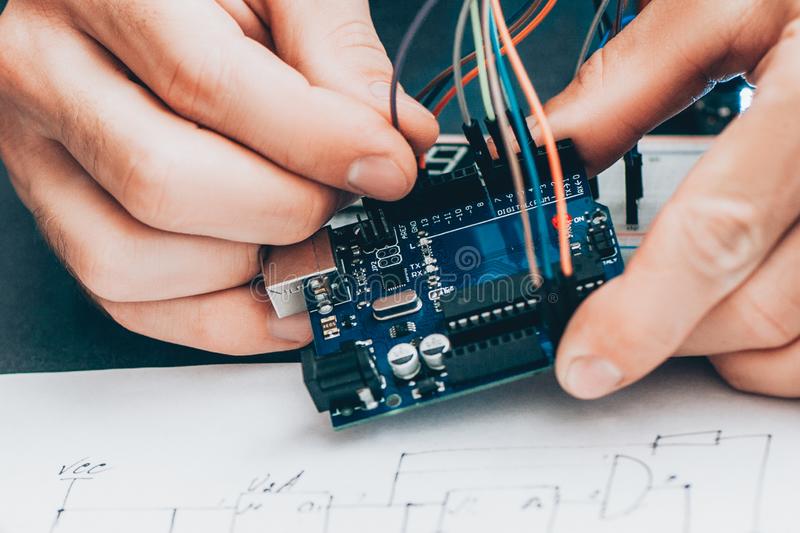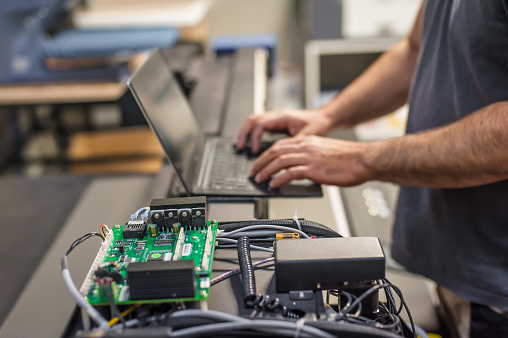For Students
STEM Jobs - 4. Engineering Technician
Admin Aug 23, 2022 03:33 PM

TAGS
An engineering technician is a qualified individual with a practical understanding of engineering ideas who specializes in skills and practices linked to a certain sector of technology. Engineers and engineering technologists frequently work together on projects involving research and development, or focus on post-development operations such as implementation and operation. an engineering technician is somewhere between an engineering technologist and a skilled craft worker. Engineering technicians are in charge of obtaining and analyzing research data, evaluating products to discover problems and areas for improvement, and assisting in the performance of tests and data collection. Civil engineering Mechanical engineering, environmental engineering, and electrical and electronic engineering are just a few of the sectors where engineering technicians can work.
Engineering technicians are responsible for solving issues and developing solutions in the research, design, development, manufacture, sales, construction, inspection, and maintenance of systems and products using the theories and principles of science, mathematics and engineering. Some engineering technicians are responsible for inspections, quality control, and processes, which may entail conducting tests and data collection.Engineering experts assist with a variety of technical issues. The duties of an engineering technician vary depending on the field in which they work, but they may include:
- construct or set up equipment
- Working with engineers to develop, design, and test solutions for a variety of engineering issues
- Examining and changing current designs
- product inspection and quality assurance
- Conducting research, analyzing data, and generating reports based on the research findings
- Developing concepts with computer-aided design (CAD) tools and incorporating comments from engineers
- Keeping correct records
- Putting together presentations
There are main the four to six branches/disciplines of this job profile as mentioned below. Apart from that,Agriculture, Aerospace, automotive, computer, environmental, biological, industrial, and manufacturing are some of the smaller branches. Each segment relies on a group of experts who can devise, manufacture, and maintain technology solutions to the difficulties that respective businesses face.
The main areas are-
- Electronics Engineering Technician- Electronics engineering technicians work alongside electrical and electronics engineers to design and develop electronic equipment such as communication devices, computers, monitoring devices, and navigational equipment. Manufacturing, research laboratories, engineering services, and the central government are all common places for an electronics technician to work.
- Mechanical Engineering Technician- Mechanical engineering professionals are experts in the construction and upkeep of mechanical devices. Before manufacturing begins, these personnel usually work in factories or development labs. Individuals with this job title may be required to study design drawings for new or modified information, produce layouts for parts that must be manufactured, review product instructions and blueprints, aid with test equipment calibration, and conduct testing for new components.Refrigerators, elevators, HVAC systems, and electric generators are some of the things they may work on.
- Industrial Engineering Technician-Industrial engineering technicians, like the role stated above, are in charge of producing vital items for machines. Unlike mechanical engineering technicians, they are also entrusted with increasing efficiency, reducing waste, and lowering costs in the manufacturing process. This could include assisting with cost analysis,monitoring and tracking inventory to order new materials, or working with the raw materials and parts shipping and receiving process. These people could work for a range of companies, firms, and organizations. They could work in a variety of fields, including business, healthcare,marketing, and customer service.
- Civil Engineering Technician-Civil engineering technicians aid civil engineers in the planning, designing, and development of private and public infrastructure. Bridges, tunnels, highways, airports, dams, and other infrastructure projects are common. Examining pre-construction field site conditions, studying and assessing project drawings and plans, and running computer-aided software according to the engineer's directions are all part of the job description.
- CAD Technician-CAD experts turn engineers' and architects' designs into technical drawings using computer-aided software. Architects, construction workers, manufacturers, and animators are all examples of industries where these people work. In addition, CAD technicians may be needed to make changes to existing CAD models, enter design parameters into CAD software, and complete job reports.
- Chemical Engineering Technician-Under the supervision of a chemical engineer, a chemical engineering technician often works in a laboratory or plant setting. They could be given a number of jobs, such as conducting experiments, performing chemical operations, or taking inventory. They are also responsible for keeping work environments clean and adhering to safety regulations. Communication skills, both oral and written, are essential. A chemical engineering technician's responsibilities mostly focus around research, manufacturing, and development.

Education and Training
Most firms require candidates to have a bachelor's degree in the field in which they wish to work (for example, a bachelor's degree in civil engineering). Another option is to join an internship programme, which typically lasts two to four years. If you're not sure if you want to pursue engineering as a full-time job, a course can teach you some of the skills you'll need.
Technical schools (Polytechnics) and non-university higher education institutions such as colleges of higher education, industrial schools, and community colleges typically provide engineering technician credentials and 2-year degrees. Engineering technologists are not the same as technicians, and many 4-year institutions and universities offer bachelor's degrees in engineering technology.
Enrolling in a four-year bachelor's degree programme to get an engineering degree is the next step an engineering technician can take to further their profession. This will broaden their employment duties, enhance their earning potential, and help them stand out to potential employers.
Skills to develop
As an engineering technician, you'll spend a lot of time analyzing data from research, experiments, and roundtable talks, so you'll need excellent analytical thinking and quantitative skills.
Because the results of this study might be utilized to improve existing designs or shape the development of new ones, meticulous attention to detail is also required. To become an engineering technician, you'll also need the following skills:
- a working knowledge of the most up-to-date technical technology
- Self-motivational abilities and proactivity
- Flexibility
- Patience
- Ability to conduct research
- Excellent communication and interpersonal abilities
Career Advice from Experts
Engineering technician jobs are on the rise, according to the Bureau of Labor Statistics (BLS), and will grow at a rate of 1-3 percent over the next few years. That number is anticipated to rise as more businesses rely on technology and development to sustain their growth. Engineering technicians have a lot of opportunities to advance in their careers. They will have earned the expertise and information required to pursue more advanced degrees and job kinds after a few years on the work.
Search
Latest Blogs

Exploring Opportunities in Emerging Engineering field
Admin
Dec 14, 2024 05:18 PM

Navigating College Majors
Admin
Sep 25, 2024 04:04 PM

Tools for Measuring Strengths For Career
Admin
Sep 25, 2024 03:27 PM
Interested in getting latest updates?
SUBSCRIBE


















